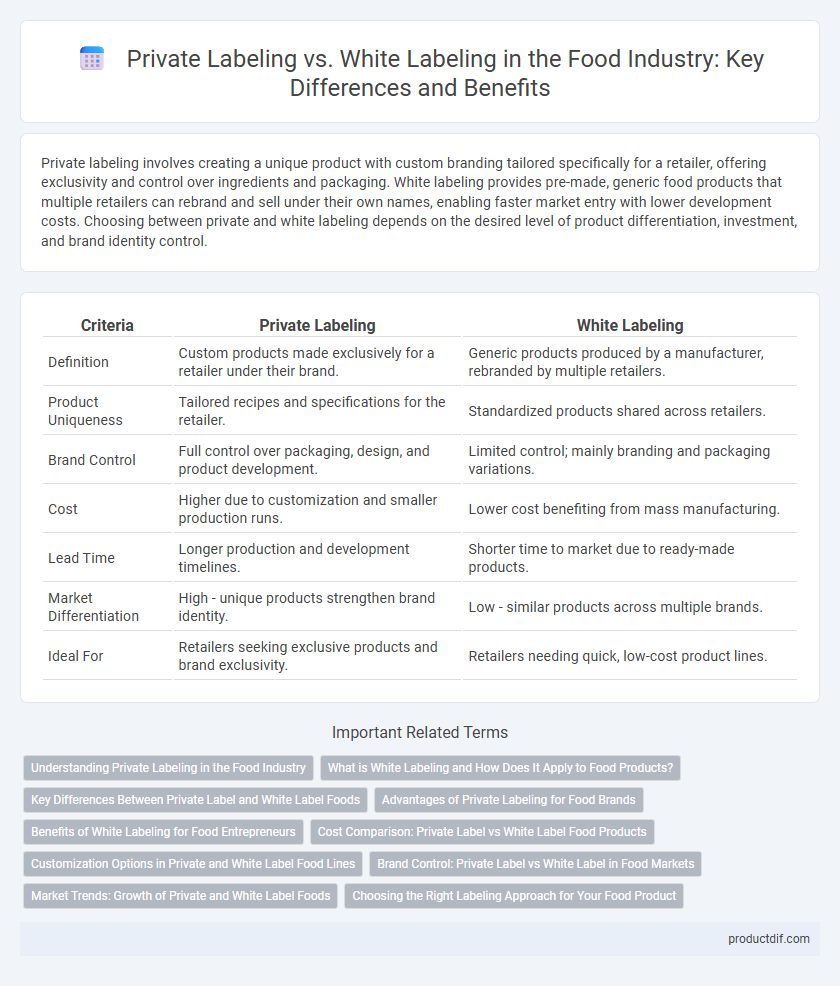Private labeling involves creating a unique product with custom branding tailored specifically for a retailer, offering exclusivity and control over ingredients and packaging. White labeling provides pre-made, generic food products that multiple retailers can rebrand and sell under their own names, enabling faster market entry with lower development costs. Choosing between private and white labeling depends on the desired level of product differentiation, investment, and brand identity control.
Table of Comparison
| Criteria | Private Labeling | White Labeling |
|---|---|---|
| Definition | Custom products made exclusively for a retailer under their brand. | Generic products produced by a manufacturer, rebranded by multiple retailers. |
| Product Uniqueness | Tailored recipes and specifications for the retailer. | Standardized products shared across retailers. |
| Brand Control | Full control over packaging, design, and product development. | Limited control; mainly branding and packaging variations. |
| Cost | Higher due to customization and smaller production runs. | Lower cost benefiting from mass manufacturing. |
| Lead Time | Longer production and development timelines. | Shorter time to market due to ready-made products. |
| Market Differentiation | High - unique products strengthen brand identity. | Low - similar products across multiple brands. |
| Ideal For | Retailers seeking exclusive products and brand exclusivity. | Retailers needing quick, low-cost product lines. |
Understanding Private Labeling in the Food Industry
Private labeling in the food industry involves retailers contracting manufacturers to produce goods under the retailer's brand, allowing unique product differentiation and control over ingredients and packaging. This strategy enhances brand loyalty by offering exclusive products tailored to consumer preferences while often reducing costs compared to national brands. Understanding private labeling requires recognizing its role in supply chain management, quality assurance, and market positioning within the competitive food sector.
What is White Labeling and How Does It Apply to Food Products?
White labeling in food products involves manufacturers producing generic items that retailers rebrand and sell under their own labels. This approach allows food brands to quickly expand product lines without investing in production infrastructure, covering items like snacks, beverages, and condiments. White labeling enables retailers to offer diverse, customized food products while maintaining control over marketing and pricing strategies.
Key Differences Between Private Label and White Label Foods
Private label foods are products manufactured by one company but branded and sold under another company's store brand, allowing for exclusive customization and branding control. White label foods are pre-made products produced by a manufacturer and sold to multiple retailers, with each retailer branding the product as their own, limiting customization options. Key differences include exclusivity, customization, and branding control, where private label offers unique product formulations and packaging, while white label relies on standardized products sold across various brands.
Advantages of Private Labeling for Food Brands
Private labeling offers food brands greater control over product formulation, packaging, and branding, enabling tailored market positioning and stronger consumer loyalty. This approach enhances profit margins by eliminating intermediary costs and supports exclusive product offerings that differentiate brands in competitive food markets. By leveraging private labeling, food companies can build unique brand identities and establish long-term relationships with suppliers to ensure consistent quality and innovation.
Benefits of White Labeling for Food Entrepreneurs
White labeling offers food entrepreneurs faster market entry by providing ready-made products that require minimal development time, reducing costs and operational complexity. Entrepreneurs benefit from established brand trust and quality assurance, enabling them to focus on marketing and distribution without the burden of manufacturing. This approach enhances scalability and flexibility, allowing businesses to quickly adapt product lines to consumer trends and demands.
Cost Comparison: Private Label vs White Label Food Products
Private label food products often incur lower production costs due to bulk manufacturing and tailored specifications, resulting in higher profit margins for retailers. White label products typically have standardized formulations and packaging, leading to reduced initial investment but potentially higher per-unit costs over time. Evaluating cost efficiency depends on factors such as order volume, customization level, and branding expenses associated with private and white label food items.
Customization Options in Private and White Label Food Lines
Private labeling in the food industry offers extensive customization options including ingredient selection, packaging design, and nutritional content adjustments tailored to specific brand identities. White labeling typically provides more standardized products with limited or no customization, allowing faster market entry and lower development costs. Brands seeking unique product differentiation often prefer private labeling to create exclusive food lines aligned with their target audience's preferences.
Brand Control: Private Label vs White Label in Food Markets
Private labeling offers food manufacturers complete brand control, allowing them to tailor product packaging, ingredients, and marketing strategies to align with their unique brand identity. In contrast, white labeling provides limited customization, as products are pre-made by third parties and rebranded with minimal alterations, resulting in less differentiation in competitive food markets. This distinction significantly impacts brand loyalty, consumer perception, and long-term profitability in the food industry.
Market Trends: Growth of Private and White Label Foods
The market for private label and white label foods has experienced significant growth driven by increasing consumer demand for affordable, high-quality alternatives to national brands. Retailers are expanding their private label portfolios, leveraging advanced supply chain strategies and product innovation to capture larger market shares. White label products also gain traction, especially in specialty and organic food sectors, as brands seek flexibility and cost efficiency.
Choosing the Right Labeling Approach for Your Food Product
Choosing the right labeling approach for your food product depends on factors like brand control, customization needs, and budget. Private labeling offers full branding and product design control, ideal for businesses aiming to establish a unique market presence, while white labeling provides ready-made products with minimal modification, suitable for quick market entry. Evaluating your target audience, marketing strategy, and production timeline ensures the optimal balance between differentiation and cost-efficiency in your food product labeling.
Private Labeling vs White Labeling Infographic

 productdif.com
productdif.com